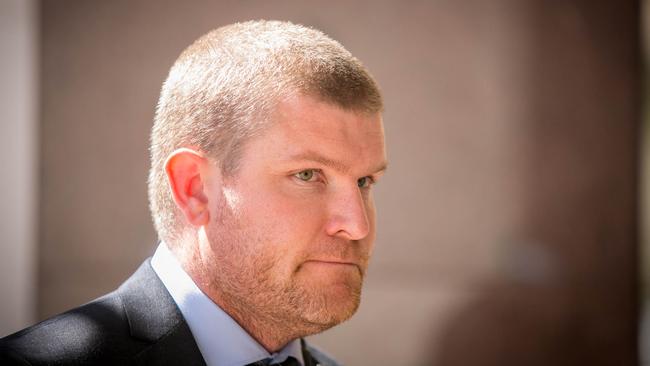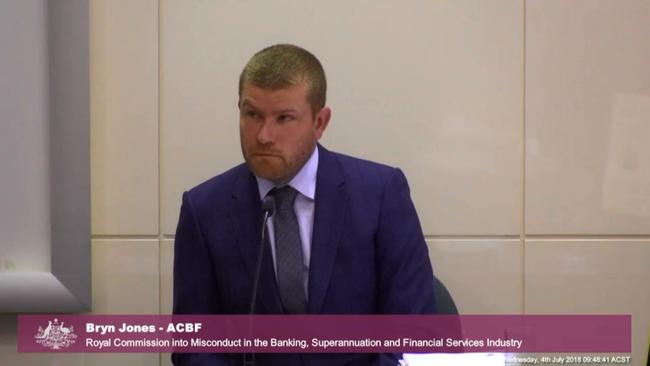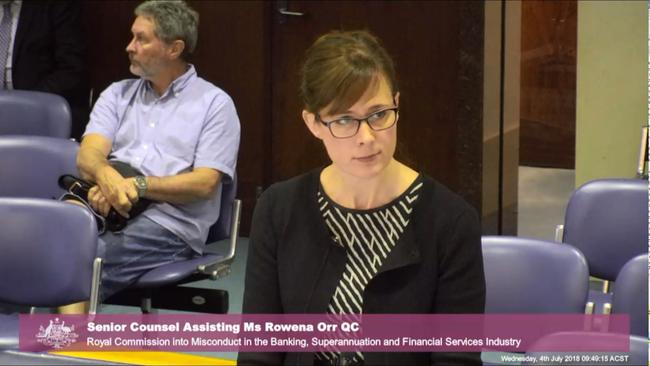Banking royal commission: Funeral insurer docked Centrepay accounts despite not knowing whereabouts
A funeral insurer debited funds from the benefits of about 6000 indigenous people despite not knowing their whereabouts.

Funeral insurer Aboriginal Community Benefit Fund was deducting money from the Centrepay benefits of about 6000 Aboriginal and Torres Strait Islander people despite not knowing where they were, and cancelled the policies when it was cut off from the welfare payments, the royal commission has heard.
Bryn Jones, chief executive of funeral insurer ACBF, told the royal commission on Wednesday the company was forced to end funeral expenses cover for about 6000 customers after the company was blocked from deducting policy premiums from Centrepay before the welfare payments reached the bank accounts of clients following a court decision.
Over the last five years, Mr Jones confirmed ACBF had cancelled 13,175 policies held exclusively by Aboriginal and Torres Strait Islanders when customers missed fortnightly premium payments, of which about 6000 were cancelled after the company was cut off from automatically deducting the premiums from welfare payments. Mr Jones said the company had tried to contact the Centrepay customers to reorganise payment methods.
“You couldn’t find them even though you had been deducting payments form their Centrelink benefits?” Counsel assisting the royal commission Rowena Orr asked. “Yes,” Mr Jones responded. Ms Orr asked: “People whose location you didn’t know?” Mr Jones agreed the company did not know where its customers were.
The royal commission on Wednesday heard Mr Jones got the chief executive job at ACBF despite not having any qualifications and no financial services experience, after having a coffee with the group’s founding director Ron Pattenden, who was a client of Mr Jones’ father.

Appearing at the royal commission hearing in Darwin for a second day of questioning, Mr Jones was questioned by Ms Orr as to whether he had written his own witness statement to the royal commission, whether he knew what the Koori Mail and National Indigenous Times newspapers were, in which ACBF appeared to breach Federal Court orders relating to advertising and whether he had any specific knowledge or skills to lead the company.
Mr Jones was appointed as a director and chief executive of ACBF late last year because a “fresh and transparent” perspective was needed at the company, he said, noting media had been “misrepresenting” the company.
Mr Jones said he had been to Palm Island on a mission and had volunteered with homeless people, but otherwise didn’t have any experience in working with Aboriginal & Torres Strait Islander people.
“I was teaching children sport and working in the IT sector,” he said.
ACBF, which is not owned or managed by indigenous Australians, only recently hired Aboriginal or Torres Strait Islander people after it decided to “transition” away from its business model of unsolicited door-to-door sales.
Mr Jones said Mr Pattenden was “not actively involved” with ACBF.
Originally from Britain, it has been reported that Pattenden ran pubs in London before arriving in Australia and establishing the Aboriginal funeral insurer. When the insurance company backing ACBF withdrew in 2001, Pattenden’s accountants, KPMG, reportedly recommended he set up a company in Vanuatu where capital of $200,000 was needed — rather than the $5 million Australian authorities required.
As part of consent orders following a 1999 Federal Court case with the Australian Securities & Investments Commission, ACBF was forced to stop using the Aboriginal flag on its advertisement and to declare that the company was a “private company, not sponsored by or otherwise connected with any governmental or similar body or an Aboriginal organisation”.
However, ACBF had advertised its policies on the National Indigenous Times website, in the Koori Mail newspaper, on national indigenous radio services and in television ads where the disclaimer was not included. “This is a breach of the federal orders, wasn’t it,” Mr Orr asked Mr Jones, who agreed.

ACBF was also the company charging the most direct debits to Palm Island residents, who live in one of the most disadvantaged places in Australia. One in three Palm Island residents is a Commonwealth Bank customer, and a review of direct debits for “non-essential services” found ACBF was charging customers the highest number of debits. Over a five month period, ACBF had charged about 2000 customers more than $45,000 for its products. Palm Island residents were also heavily charged for direct debits by payday lenders Cash Converters, Latitude, Ezi Debt, Credit Corp and life insurers TAL, NobleOak and Suncorp.
Yesterday, Mr Jones admitted that about 30 per cent of ACBF’s policyholders are aged under 18, while a further 15 per cent are less than 25 years of age. Mr Jones was probed on whether he “actively” attempted to sell policies to children and grandchildren. Mr Jones cited mortality rates of Aboriginal people as a reason why they may need the policies, and admitted the company has a “standard fee” that applies to customers who sign up from birth. Anyone under the age of 70 can be signed up to the company’s policies, which charged higher fees for customers with certain illnesses.
Mr Jones yesterday admitted ACBF produced inaccurate media statements less than a week before it was scheduled to appear at the banking royal commission, which hid the fact it was forced to overhaul its corporate structure after it breached anti-hawking laws.






To join the conversation, please log in. Don't have an account? Register
Join the conversation, you are commenting as Logout